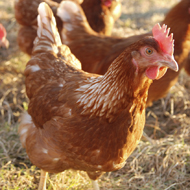Farmers and scientists team up to tackle key issues

The research topics have been suggested by farmers.
Funding has been awarded to three projects suggested by farmers, who will work with scientists to improve animal welfare and productivity, reduce costs and produce healthier food.
The projects tackle three key challenges facing farmers - growing healthier food, managing weeds without herbicides and finding affordable protein feed for poultry, pig and fish farming.
Between them, the research projects have been awarded nearly £50,000 as part of the Duchy Originals Future Farming Programme - which is funded by the Prince of Wales' Charitable Foundation.
The research projects to be chosen are:
"Winter grazing cereals: the effects on crop-weed competition and grain yield"
This project looks at how grazing winter wheat with sheep can help control black grass - a weed that affects many farms across Britain.
"Increasing insect consumption by laying hens in free range systems to reduce feed costs, enhance food quality and improve welfare"
This research by Stonegate and the University of Bristol could lower feed costs, boost hen welfare and make eggs more nutritious. In future, it could even make a difference to the welfare of hens kept in gardens as pets.
"Enhancing iodine and other trace element content of organic milk"
Organic milk contains less iodine than conventionally produced milk, therefore Acorn Dairy and Newton Farm have joined forces with Newcastle University to try to increase trace elements, including iodine, in organic milk.
Dr John Tarlton from the University of Bristol said: "This exciting research study funded by the Duchy Originals Future Farming Programme aims to address a number of issues central to the future sustainability of free range egg production. These include improving welfare, reduced feed consumption and enhancing the nutritional quality of eggs.
“If successful this study will point the way towards improving hen welfare, reducing reliance on grain feed and improving egg quality for the consumer.
"The exciting aspect of this study is that it will encourage farmers to adopt practices of sustainable intensification which are right for the hens, the consumer and the economics of the industry."



 FIVP has shared a survey, inviting those working in independent practice to share their views on the CMA's proposed remedies.
FIVP has shared a survey, inviting those working in independent practice to share their views on the CMA's proposed remedies.